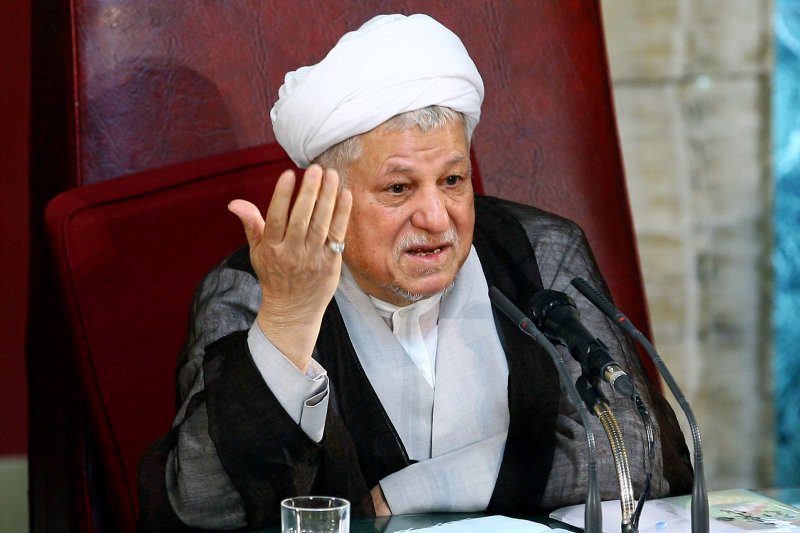Former Iranian President Akbar Hashemi Rafsanjani, who was Tehran's Parliament speaker during the 1980-1988 war with Iraq, said in a recent interview that Iranian officials developed a secret nuclear weapons program during the Iran-Iraq War because they feared they might someday have to use nuclear weapons against Baghdad. Photo by Maryam Rahmanian/UPI |
License Photo
TEHRAN, Oct. 29 (UPI) -- During its war with Iraq that lasted for nearly the entire decade of the 1980s, Iranian leaders believed it may eventually become necessary to use nuclear weapons against its neighbor nation, the Islamic country's former president said in a recent interview.
Akbar Hashemi Rafsanjani, the president between 1989 and 1997, told the website Iranians' Nuclear Hope that Tehran officials secretly developed a nuclear weapons program at the very beginning of the conflict with Iraq in 1980 -- believing the arms may ultimately make the difference between winning and losing the war.
"When we first began, we were at war and we sought to have that possibility for the day that the enemy might use a nuclear weapon. That was the thinking. But it never became real," he said in the interview, which was also posted by Iranian state news agency IRNA this week.
Rafsanjani, who was Iran's First Chairman of the Parliament during the war, said non-military potential for the nation's nuclear program led the government to continue investing in and developing it.
"Our basic doctrine was always a peaceful nuclear application, but it never left our mind that if one day we should be threatened and it was imperative, we should be able to go down the other path," he said.
The Iran-Iraq War, which lasted from 1980 to 1988 and was the 20th Century's longest conventional war, ended in stalemate and substantial economic and infrastructure damage to both sides.
But according to Rafsanjani, the conflict could have ended a lot differently.
"In 1981, the atmosphere was such that we had to arm ourselves with deterrent measures ... since we thought that this war could continue another 20 years," Rafsanjani added.
The former president also touched on the recent nuclear accord struck by Tehran and six Western nations, led by the United States, and downplayed the idea that agreeing to peaceful nuclear development in exchange for the lifting of sanctions weakens Iran's national security.
"The foundations of Iran's security are so strong that this matter constitutes not even the slightest threat to Iran," he said. "Our missile defense is not part of the [nuclear deal] and we did not even get into this issue [in negotiations]."
Further, Rafsanjani stated that it's also up to the Western parties to the accord -- particularly the United States -- to hold up their ends of the bargain. If they don't, he said, the deal is effectively off.
"The fact that they are funding the conversion of the heavy water [nuclear reactor] into a different type that has no plutonium but still has all the elements of a heavy water [reactor] -- this is cutting-edge technology, and constitutes advancement for us," he said. "We do not want plutonium, because it is meant for military matters. As far as I know, [the agreement] poses no national threat, and the guarantees that it will be implemented are not unilateral.
"If they violate [the deal], then we can violate [the deal] as well."















